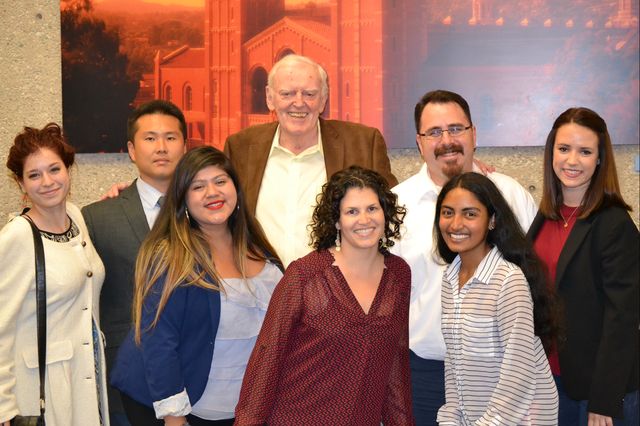UCLA senior Haley Hood says that when given an opportunity, children will invest in their own education and excel. This is something she learned after launching a writing club for group of six fourth-graders at Nora Sterry Elementary School in West Los Angeles.
With support from UCLA’s Astin Civic Engagement Scholars Program, Hood designed the writing club as a real-life laboratory to investigate how journal writing might influence students’ attitudes toward literacy.
“It turned out to be an incredible experience and I think just being able to take advantage of it had been the most amazing and the best part of my UCLA experience,” she said.
Hood is one of five graduating seniors who conducted research in the community this academic year as part of the Astin program. Administered by the Center for Community Learning, the program encourages undergraduate students and faculty to get involved in the community by integrating teaching, research and service.
“It’s an innovative undergraduate experience that combines rigorous training in conducting research with sustained engagement with the community partner organization,” said Pat Turner, dean and vice provost of undergraduate education at UCLA.
The Astin scholarship program — created by the Office of the Chancellor in 2009, in partnership with the vice provost for undergraduate education — honors retired UCLA faculty members Helen and Alexander Astin. The Astins conducted important research demonstrating the positive effect community service can have on the lives of college students. The year-long program comes with a $6,000 award.
Hood, who is majoring in anthropology and minoring in education, and her writing group initially met once a week. Hood said she quickly learned that the students worked best when they could choose their own topics. They even started suggesting ways to accelerate their work, by meeting twice a week instead of just once, and expanded their activities to include projects, posters and a Monday Math program.
“I also recognized that they were teaching each other, so automatically when a student would ask a question one of the other students would answer it instead of waiting for me to answer it, which I think is important and something that I was not seeing happening in their classroom,” said Hood, who has been accepted to UCLA’s Graduate School of Education.
Hood said that she’d never even considered doing undergraduate research before learning about the Astin program, which she heard about while taking an internship course at the UCLA Center for Community Learning. The center facilitates service learning courses, internship courses, civic engagement Fiat Lux courses, scholarships through AmeriCorps and UCLA’s undergraduate minor in civic engagement.
► More UCLA Newsroom commencement news and photos.
Fellow Astin scholar Howard Chung, who is majoring in the study of religion, partnered with Prison Fellowship, a Christian prison ministry based in Inglewood. He studied the impact that faith-based offender rehabilitation programs were having on those who had been incarcerated.
Chung, who had been incarcerated several times before coming to UCLA as a transfer student, interviewed participants about their lives prior to incarceration to understand the events that led to their imprisonment. He also asked them about their opinions and interactions with the faith-based program staff.
“It’s important toward developing programs for prisoners and the extended population we seek to serve,” Chung said, adding that their faith and the fellowship they experienced as part of a faith-based rehabilitation program was beneficial to them. “All of my interviewees had a desire to change. They got tired and they wanted a new way of life.”
Eunice Gonzalez-Sierra worked with Frente Indigena de Organizaciones Binacionales in her hometown of Santa Maria, California, to examine the experience of indigenous immigrants from Oaxaca, Mexico, as they navigate public medical, legal and educational systems in the United States. Santa Maria has a robust population of Oaxaqueños, and very few speak English or Spanish, said Gonzalez-Sierra, who focused on speakers of three specific indigenous languages.
Language deficiencies and fear of deportation are the biggest barriers to service for this population, she said, noting that this research opportunity allowed her to study a group that little is known about.
“I think we also need to have more awareness about Oaxaqueños in academia and ethnic studies,” said Gonzalez-Sierra. “As a Chicano Studies major, I don’t feel that there is enough knowledge of this community within the courses I’ve taken.”
Additionally, sociology major Radha Kumar worked with Create Now, a Los Angeles-based non-profit organization that provides arts workshops to low-income children. Gabrielle Bonder, a fourth-year world arts and culture major, who is minoring in civic engagement and visual and performing arts education, partnered with the Museum of Tolerance, to produce a case study examining the effectiveness of how the museum’s efforts to educate students to about multiculturalism.
“This program is special in the sense that we’re focused on our community partners,” said Bonder. “It’s been an amazing experience; the idea that we’re not just doing research for personal benefits, but we’re also doing it to benefit our community partners in some way.”





